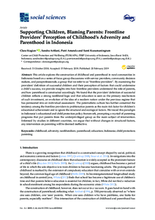Abstract
This open access article explores the construction of childhood and parenthood in rural communities in Indonesia based on a series of focus group discussions with service providers, community decision makers, and paraprofessionals; a group that we refer to as “frontline providers”. By examining the providers’ definition of successful children and their perception of factors that could undermine a child’s success, we provide insights into how frontline providers understand the role of parents, and how parenthood is constructed accordingly. We found that the providers’ definition of successful children reflects a strong neoliberal logic and that education is seen as the primary mechanism of such investment, an evolution of the idea of a modern nation under the previous regime that has permeated into an individual assessment. The paternalistic culture has further cemented the tendency among the frontline providers to problematize parents as the main risk factor for children’s educational achievement and to ignore the structural and ecological factors. We traced this paradigm in Indonesia’s educational and child protection policy framework, prompting a myriad of parenting programs that put parents from the underprivileged group as the main subject of intervention. Informed by studies in different countries, we argue that without changes in structural factors, any intervention on parenting will be deemed ineffective.

